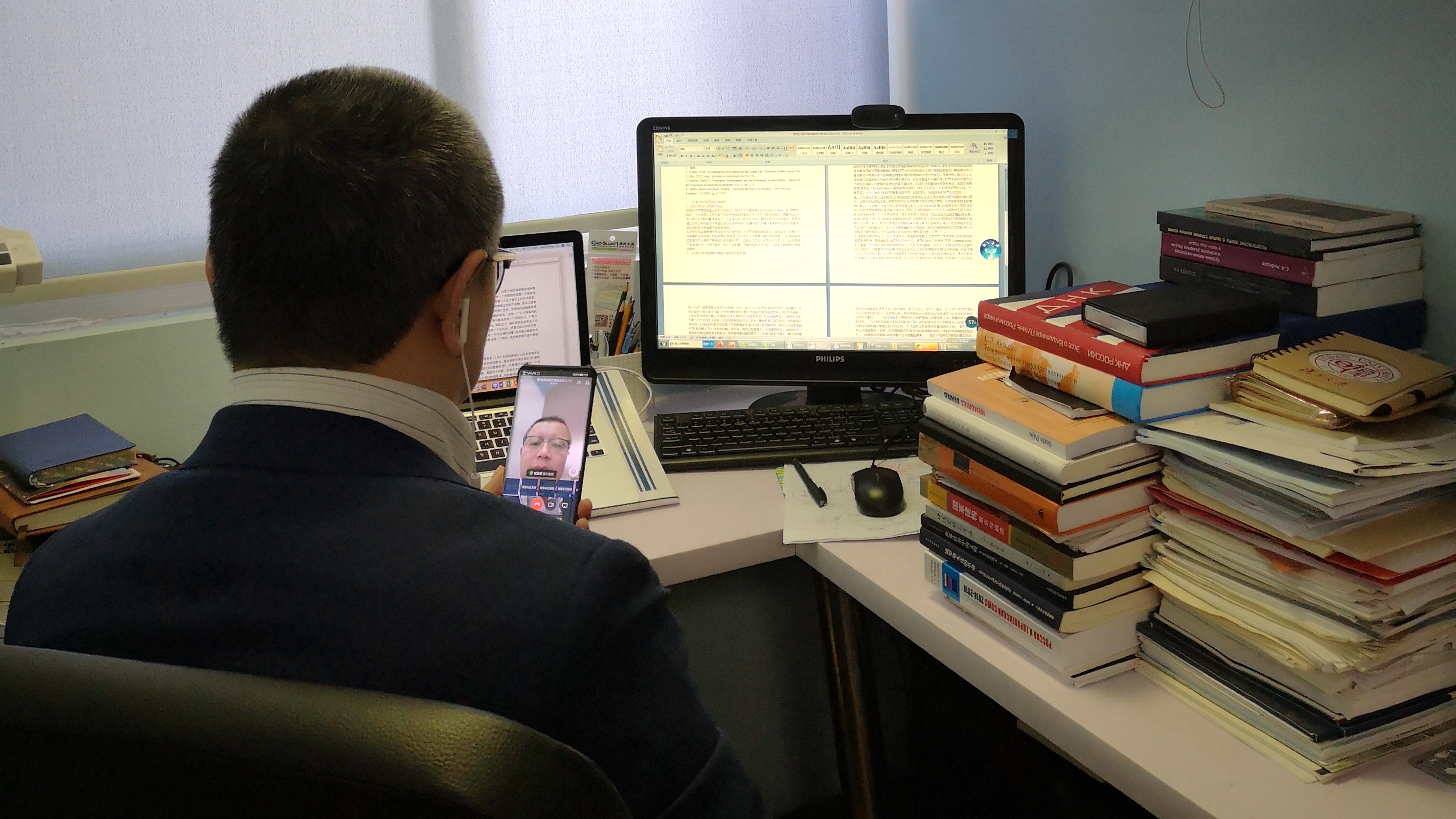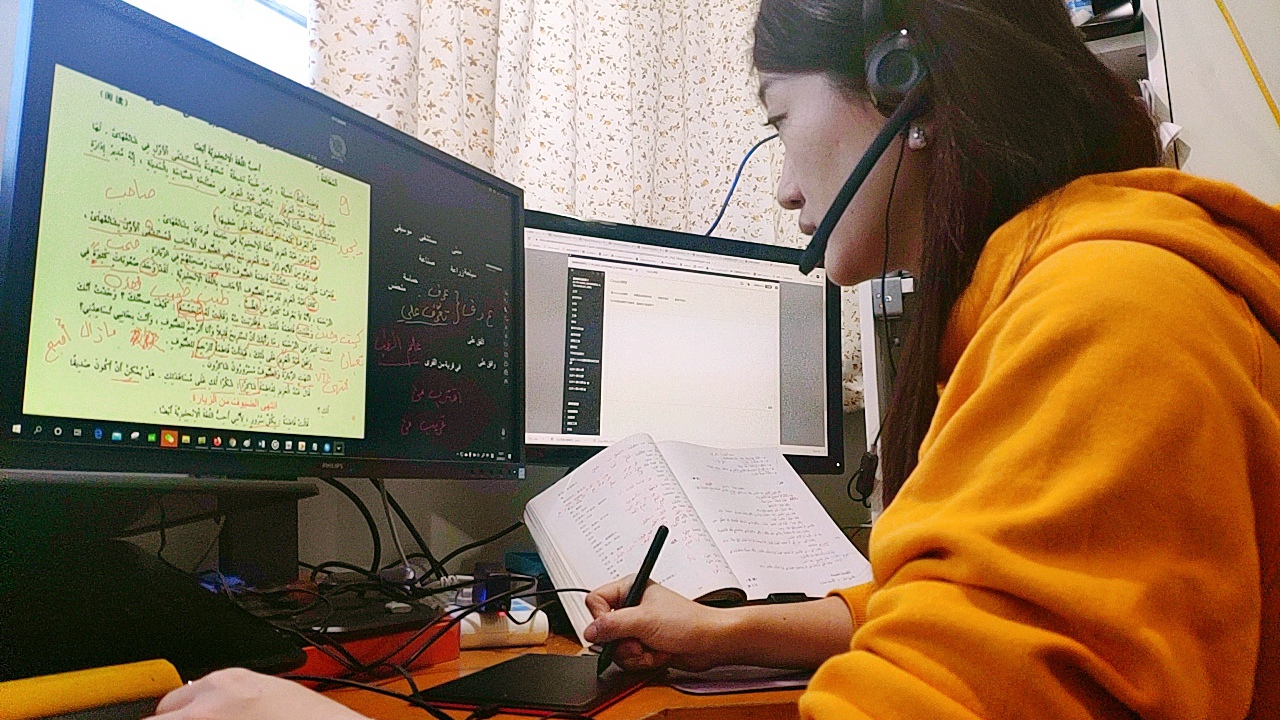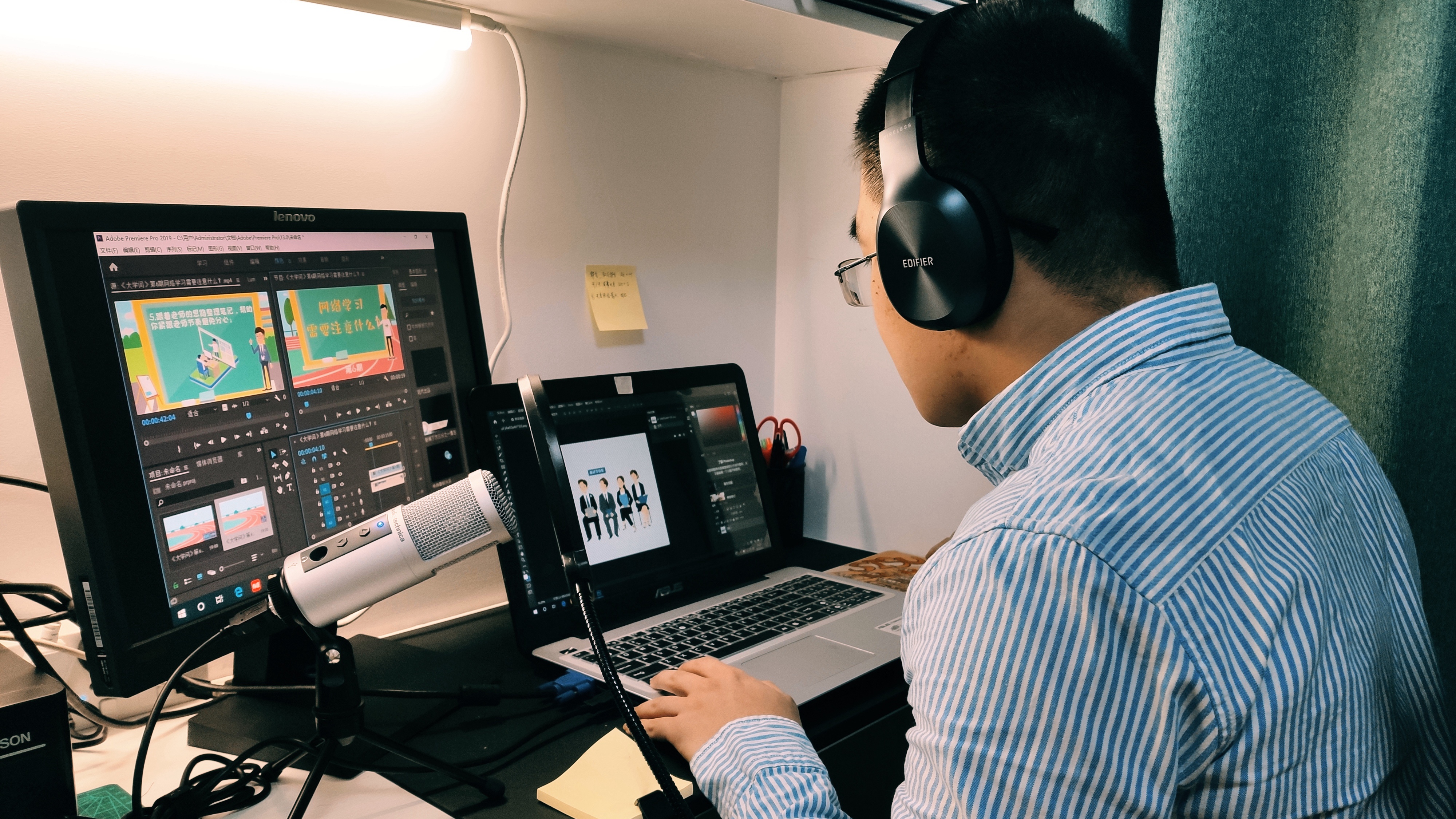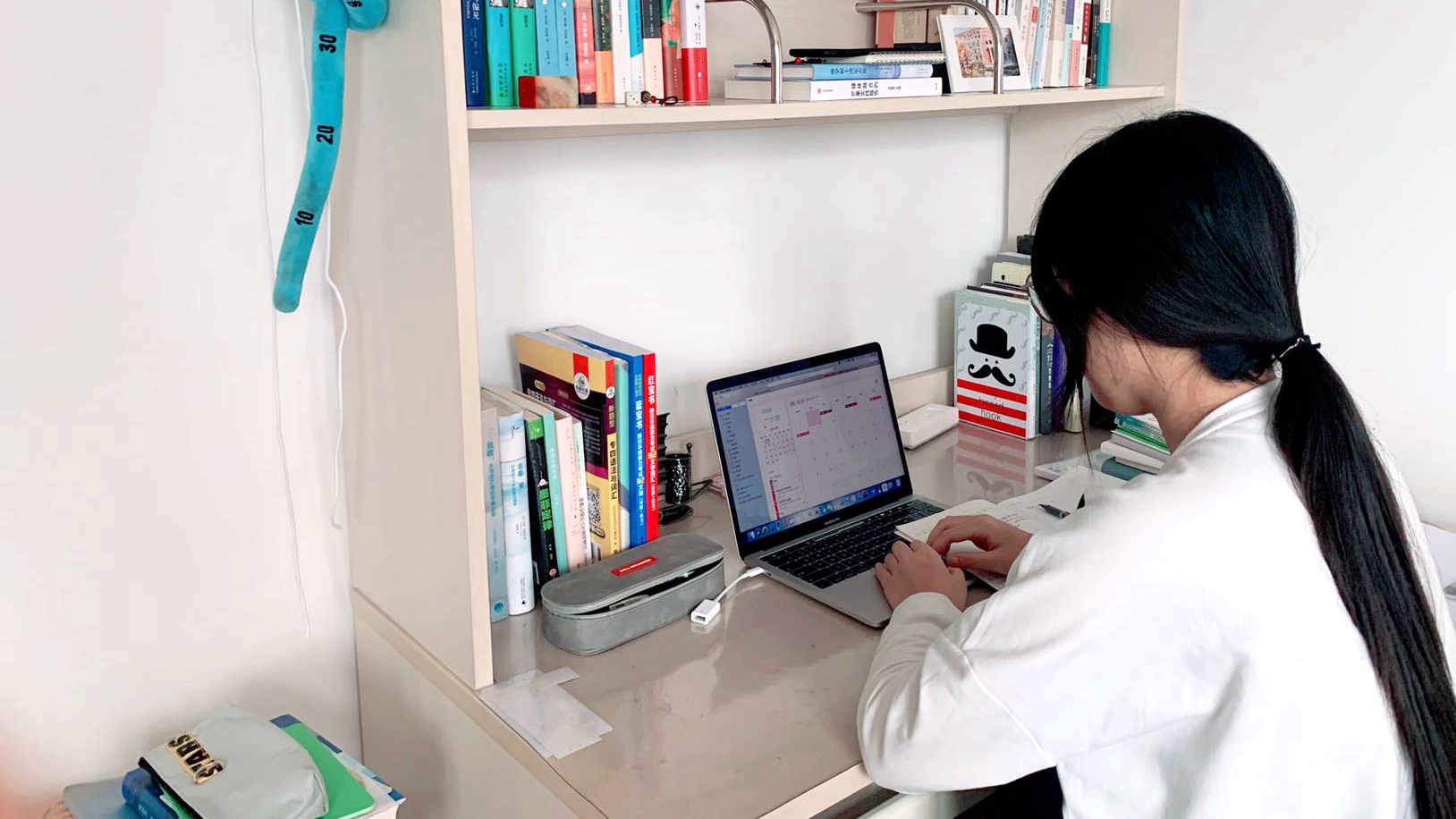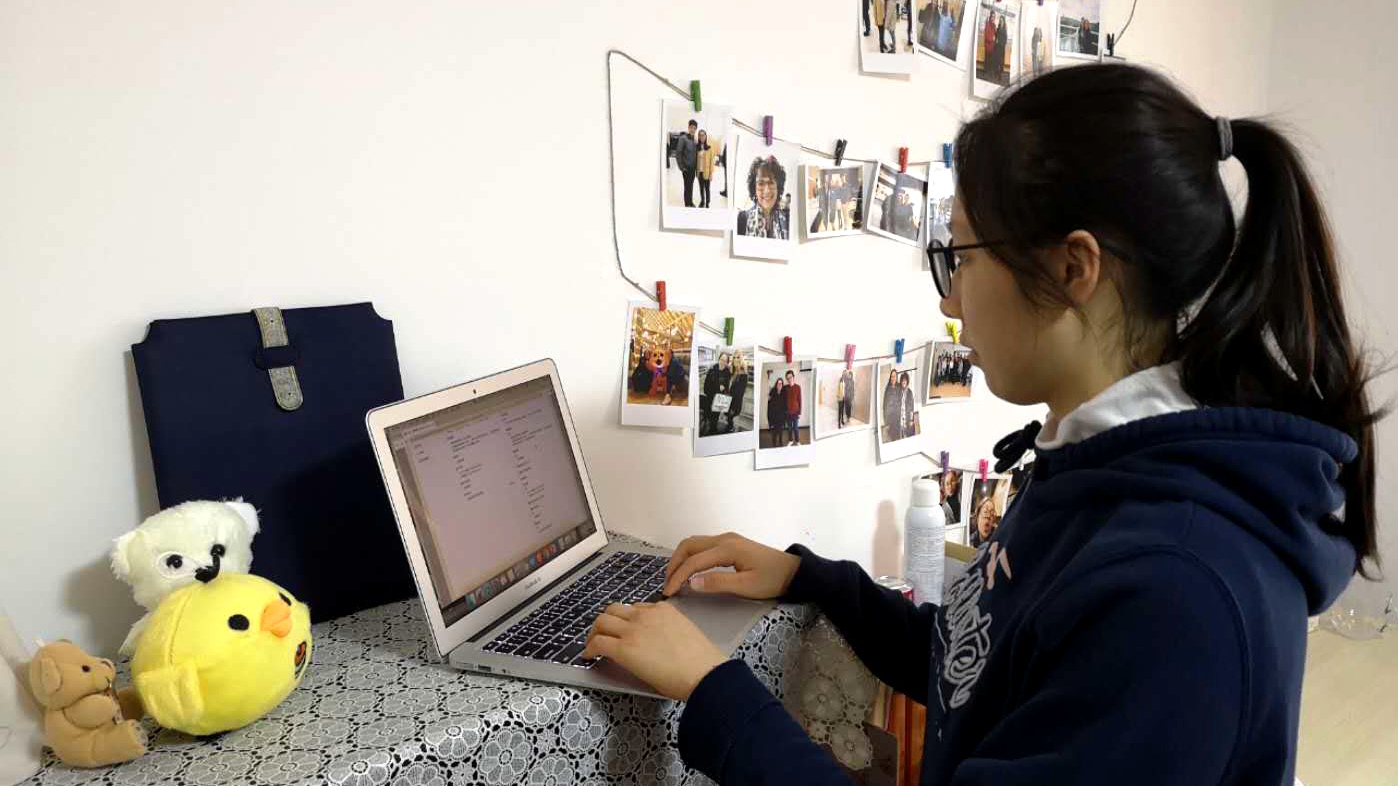| O |
n March 2, Shanghai International Studies University started its new semester online.
To minimize the disruption to teaching and learning amid the epidemic, the school turned to distance learning. A total of 1,538 undergraduate courses and 423 graduate courses, including the ones taught by foreign teachers, were ready to launch on e-learning platforms weeks before the semester began.
388 undergraduate courses and 88 graduate courses opened on the first day. More than 10,000 students attended.
Quality teaching maintained on new platforms
For course construction, SISU teachers primarily used three teaching management platforms: Blackboard Learn (BB, http://shisu.blackboardchina.cn/), SISU Course Center (cc.shisu.edu.cn), and e-Learning (eLearning.shisu.edu.cn). To introduce more interaction, many teachers also used online streaming services like ClassIn, WeLink and WeChat Work, in addition to video-on-demand platforms, such as BB and SISU Videos (v.shisu.edu.cn). Most classes are given in the form of “online lectures + online tutorial”.
Despite the suspension of on-campus teaching, SISU teachers and students have found ways to re-connect.
Yang Cheng, coordinator of the specialized postgraduate program in European and Asian Studies, opened many courses for undergraduate and postgraduate students, including Russian Politics and Foreign Affairs, Diplomacy and Management of Foreign Affairs, Russian Economy and Society, Practices in Diplomacy and Foreign Affairs, and Regional and National Case Studies.
As an expert in international issues with rich experience in live TV broadcasting, Yang decided to live stream his lectures on DingTalk, Tencent Meeting and Zhihuishu, and complement them with tutorials and homework feedback on Wechat. He also adjusted his teaching methods to suit the needs of students, who come in different class sizes and are attending different courses.
To encourage the students to bring their language proficiency and expertise into full play, Yang also asked them to create daily briefings about the covid-19 in Eurasian regions by trans-editing the news.
Yang considered his online teaching went well based on the students’ feedback from the first day and the previous pressure test. “Online and offline teaching are not that different essentially. With the help of modern technology, teachers can follow their students’ learning status very close.”
“At the same time, online lectures should be complemented by homework and tutorial. Both are indispensable,” he added.
Shi Yue, a teacher of Arabic Studies at the School of Asian and African Studies, is giving three courses this semester. She has chosen to use both live streaming and recorded broadcasting for her freshmen Intensive Reading class. She reflected that both broadcasting tools can produce good results and the platforms can enable interaction between and among teachers and students easily.
In fact, before the epidemic, Shi had already used online systems to manage her undergraduate courses, for homework assignment, speaking tasks and academic counselling, which has enabled her students to continue learning during the winter holidays.
Looking forward to the new semester, she hopes that SISUers can cherish every learning opportunity and get ready to rejoin one another in the classroom in the upcoming spring.
SISU students also embraced the new online learning experience.
“Actually I like taking online course. My Intensive Reading teacher prepared fascinating content and recorded it on PPT. Also I get to manage my learning progress myself. Besides, teachers offer to answer our questions at any time in WeChat group,” said freshman Dong, from the School of Japanese Studies.
Senior student Ma, from the School of English Studies, took an online Intensive Reading course this morning. After previewing the teacher’s PPT slides and other supplementary materials, she attended the class through live broadcasting, which allowed her and the students to interact with the teacher in real time. Ma said, “Since the teachers have already uploaded relevant learning materials to the websites, I can get better prepared, and take notes on the materials directly and conveniently. More importantly, the biggest strength of taking online courses is that you get to re-watch the videos and can spend more time on the parts you did not understand or hoped to understand better.”
Junior student Chen, from the School of Business and Management, finds online course highly efficient and exciting. “In an online classroom, students can interact with teachers through their microphones. The interaction could get as intense as if you were in a real classroom, if not more so. Also, when you could not see the teachers, you need more self-discipline, constantly reminding yourself to pay attention.
Freshman Chen, from the School of Journalism and Communication, just finished his Outline of Chinese Modern History class. He also thought that online course demands more self-discipline on the students’ part, and he hopes that the epidemic could end soon so that he could resume his study in the real classroom.
Before the first day of the new semester, counselor Liu Jian from the Department of German Studies released a series of videos to address students’ concerns and offer tips for online learning, hoping to raise the students’ attention to important matters so that they could focus on improving themselves in this unusual time and better prepare themselves for the upcoming semester.
Timely actions taken to launch online teaching
To ensure the quality of online teaching, the university leadership issued plans and arrangements in advance, promoting the use of high-quality materials among the teachers. In addition, Shanghai Foreign Language Education Press, the university’s affiliate publisher, also provided free access to its resources.
The Department of Educational Technology of the School of Education offered support services to the teachers and students. Much coordination within and between departments has been achieved to act on feedback and make sure no student is left behind.
To make the courses more accessible, SISU Information and Technology Center has launched a portal to all platforms (a class.shisu.edu.cn), expanded SISU Cloud storage, VPN and output bandwidth, upgraded the server resource base, joined CARSI to enable off-campus access to CNKI, and facilitated the digitalization of printed teaching materials.
Quality control system in place for online teaching
In line with the requirements by the Ministry of Education and Shanghai Municipal Commission of Education, SISU carried out a five-day pressure test at the end of February. On the first day, University Council Chair Jiang Feng, SISU President Li Yansong, Vice President Yang Li, and leaders of related departments monitored the process. The university leadership studied the feedback from the pressure test and proposed solutions to the problems.
SISU is soon to distribute a survey to learn more about the students’ experience of online learning, and new evaluation forms specially designed for the review of online teaching.
The platforms:
Blackboard Learn is the most widely used virtual learning environment and learning management system among institutions of higher education, enabling thousands of colleges and universities in more than 90 countries to offer innovative blended teaching and learning. Students can access it through an internet browser, including from their mobile devices. Because the system is based on Alibaba Cloud, students can have direct access without the need to log into the campus VPN.
SISU Course Center is an undergraduate online learning management platform that integrates resource sharing, curriculum management, interaction, learning outcome presentation, and data analysis. Users can have access through both private and public cloud servers to a wide range of high-quality education resources and services.
SISU eLearning is an online learning platform based on Moodle, one of the world’s most widely used open source course management system. Moodle supports open industry standards for E-learning, including IMS, SCORM, and QTI. With it, students across the world can enjoy courses and activities on their mobile devices.
The article is translated by Gao Jiahui, Chen Shifan, Huang Yuhong, Zhao Yongzi, Yuan Yue, Yang Ziwei, Hong Yinglu, Li Xiaoyi and Zhang Ruijie, and proofread by Lu Yuyang, Wang Bo and Chen Qinyu, members of the Translation Association of the School of English Studies (SESTA) at Shanghai International Studies University. For use of the content, please contact: ses_translators@163.com.


